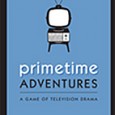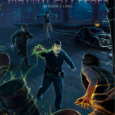HotB, or as the GM told me Wick has been calling Hot Blooded, is a great game that takes people some time to get acquainted with. It incorporates narrative control, stakes, wagers and aspects into a pretty tight bundle of rules. All of these things are very cool and this is exactly the kind of thing I would do if I were creating a game (essentially pilfer from lots of other sources).
Our game had three players, one who was fairly familiar with the game and had run it several times, myself who had only played once before and one other player who knew absolutely nothing about the game. For play testing purposes I would say this was a pretty ideal group.
We ran through the adventure in the back of the book and as it’s very fun and I encourage others who are picking up the book to use it, I’m not offering any spoilers.
What rocked
The pseudo random character generation (“you can’t pick your family”) was cool. I ended up playing a Falcon, which I wouldn’t have picked otherwise and intentionally picked all of my social stats to stink at (Wisdom, Cunning and Beauty were all horrible). This semi-random element made for some very cool tensions between the characters.
I schooled Lady No in a battle of insults. This is the fickle way dice roll. My character being an uncouth Thorne affronted Lady No who took a stab at me. We traded just a few insults (her calling me a barbarian and me calling her a red widow) before I said “enough” and dice were rolled. Somehow she got crap and I rolled fantastic. This young noble made Lady No blush, and probably gained an enemy for life. Great times.
The wager system allowed for some amazing flourishes. For instance, even when bested in a race I was able to add in the presence of a specter in the puzzle house, which came up later during a hunt. The other players were able to garnish favors and gain love through them as well. I really like this structured form of narrative control.
The Ven are supposed to be people ruled by their passions and simultaneously obsessed with ritual. I thought I’d try to stick with the former, be brash and bold. And it worked! I physically manhandled the lady to make her dance with me. I insulted a political figure to her face and I bravely hunted down a specter. It was awesome!
I Love that using your name means something in this game. In the previous game I played “Drial”, which means “I am your friend”. In this game I played “Dosajee” which means “In the Suaven I trust”. In both games I used my name in nearly every roll not to just add dice to but color my actions. It was awesome; I really love part of the game.
I got to duel. Man, I’m such a spotlight hog. A duel and a battle of insults. I kicked this specter in the pants. She had a slight advantage on me at first but that was quickly mitigated by a brutal arrow in the chest from my Ironwood bow. Rock!
What could have been improved
In many ways the game feels very alien to players who aren’t used to trading narrative control. Personally I’m really interested in it but not very experienced with it so I still stumbled a bit in the beginning. I think the intro scene which essentially asks “what are you doing here?” is a difficult one because it’s simply too broad. I like what it accomplishes (giving some definition to the game) but it seems like a tough challenge early on. I think that perhaps starting the game with a more straightforward encounter (like bandits on the road) might be and easier introduction to the system as the players have clearer expectations of what is supposed to happen then.
The GM wanted to use the first names as aspects so we created an invoke, tag and compel for about 20 of the names but ended up using the core rule (which treats them like a very flexible but not powerful aspect) so some work ended up not being used. Not a major problem.
While character aspects were really spelled out, situational aspects seemed to hearken back to SotC mechanics. We created to location aspects, a mask and a puzzle floor. Both of which seemed to be invoked in arbitrary manners. That is totally fitting for Fate but didn’t fit the HotB mechanics that each aspect has one specific invoke, tag and compel.
It was not always clear what the scope of a wager could be. There were some “can I do this?” questions that came up as well as some “I don’t think you can fit all of that in one wager” vetoes. This was definitely a case of understanding the scope of the original conflict and working within that.
Overall I loved the game. Our only hang ups were in getting acquainted with the system and as we became more comfortable the game ran smoother.



I wish I could get my players into the idea of narrative control, they just look at me blankly and wonder why I am not leading them by the hand…
Yeah, I once thought you could just hand it over and people would grab it. Sadly most of the time they won’t or aren’t sure what to do when they have it.
There are some decent transition games. SotC for example gives Narrative Control to the GM 90% of the time but with Declarations the players can state facts and roll to see if they are true.
Also Burning Wheel is narrated by the GM but gives the players room for negotiation. If the GM follows Luke’s format he’ll respond to every action with “if you fail this X will happen” and the players can work with the GM for a different outcome, thus giving them some more control of how things play out.
Finally there is a trick that Macklin uses that puts players on the spot but only for really easy things. He’ll tell one player “You see a picture on the wall that chills you to the bone” and turn another player and asks “what is the picture of?” or “why did he have this reaction to the picture?” and thus makes them narrate in minor details around a known structure (e.g. that the picture is scary).
My fourth and final bit of suggestion is to get a cattle stamp that says the word NARRATE on it and keep it next to an open fire while you play. Make sure the player have all seen what it says before the game starts.
so where can get one of those branding irons made up at…..